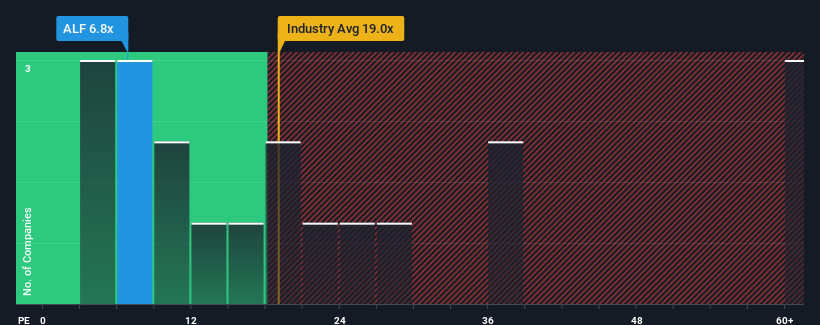Allied Farmers Limited (NZSE:ALF) Screens Well But There Might Be A Catch
With a price-to-earnings (or "P/E") ratio of 6.8x Allied Farmers Limited (NZSE:ALF) may be sending very bullish signals at the moment, given that almost half of all companies in New Zealand have P/E ratios greater than 16x and even P/E's higher than 32x are not unusual. However, the P/E might be quite low for a reason and it requires further investigation to determine if it's justified.
Earnings have risen firmly for Allied Farmers recently, which is pleasing to see. It might be that many expect the respectable earnings performance to degrade substantially, which has repressed the P/E. If you like the company, you'd be hoping this isn't the case so that you could potentially pick up some stock while it's out of favour.
See our latest analysis for Allied Farmers
Want the full picture on earnings, revenue and cash flow for the company? Then our free report on Allied Farmers will help you shine a light on its historical performance.
How Is Allied Farmers' Growth Trending?
There's an inherent assumption that a company should far underperform the market for P/E ratios like Allied Farmers' to be considered reasonable.
Retrospectively, the last year delivered an exceptional 16% gain to the company's bottom line. Pleasingly, EPS has also lifted 169% in aggregate from three years ago, thanks to the last 12 months of growth. Accordingly, shareholders would have probably welcomed those medium-term rates of earnings growth.
Comparing that to the market, which is only predicted to deliver 8.8% growth in the next 12 months, the company's momentum is stronger based on recent medium-term annualised earnings results.
With this information, we find it odd that Allied Farmers is trading at a P/E lower than the market. Apparently some shareholders believe the recent performance has exceeded its limits and have been accepting significantly lower selling prices.
The Bottom Line On Allied Farmers' P/E
While the price-to-earnings ratio shouldn't be the defining factor in whether you buy a stock or not, it's quite a capable barometer of earnings expectations.
We've established that Allied Farmers currently trades on a much lower than expected P/E since its recent three-year growth is higher than the wider market forecast. When we see strong earnings with faster-than-market growth, we assume potential risks are what might be placing significant pressure on the P/E ratio. At least price risks look to be very low if recent medium-term earnings trends continue, but investors seem to think future earnings could see a lot of volatility.
And what about other risks? Every company has them, and we've spotted 1 warning sign for Allied Farmers you should know about.
You might be able to find a better investment than Allied Farmers. If you want a selection of possible candidates, check out this free list of interesting companies that trade on a low P/E (but have proven they can grow earnings).
Have feedback on this article? Concerned about the content? Get in touch with us directly. Alternatively, email editorial-team (at) simplywallst.com.
This article by Simply Wall St is general in nature. We provide commentary based on historical data and analyst forecasts only using an unbiased methodology and our articles are not intended to be financial advice. It does not constitute a recommendation to buy or sell any stock, and does not take account of your objectives, or your financial situation. We aim to bring you long-term focused analysis driven by fundamental data. Note that our analysis may not factor in the latest price-sensitive company announcements or qualitative material. Simply Wall St has no position in any stocks mentioned.

 Yahoo Finance
Yahoo Finance 
